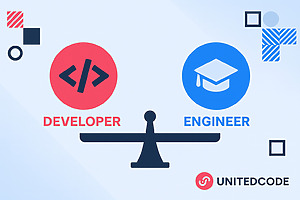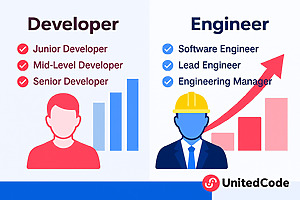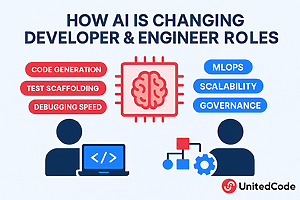Choosing the right technical expert can define the success or failure of a project, yet many companies still blur the line between a software developer and a software engineer. At first glance, the two roles appear interchangeable—both write code, both contribute to product delivery, and both are vital to building modern digital systems. But the reality is more nuanced: developers and engineers bring different scopes of responsibility, problem-solving approaches, and long-term impact on business outcomes. Confusing these roles often leads to hiring mismatches, wasted resources, and teams that lack the balance needed for sustainable growth.
This article provides a clear framework for understanding the difference between software engineer vs developer, examining their definitions, skill sets, educational backgrounds, and career trajectories. We’ll also explore how AI is reshaping these professions, when companies should hire one role over the other, and how UnitedCode’s IT Talent Acquisition Solution helps organizations make better staffing decisions. With this knowledge, tech leaders can optimize team composition, control costs, and build resilient engineering pipelines that scale with business demands.
We will cover:
- Core Definitions and Disciplinary Distinctions
- Scope, Tools, Problem-Solving, and Team Roles
- Technical and Soft Skills, Education, Certifications
- Career Paths and Progression Opportunities
- Hiring Guidelines for Developers vs. Engineers
- AI’s Influence on Both Roles and Talent Adaptation
- Clear Answers to Common Role-Comparison Questions
Software Developer vs Software Engineer: Hiring Insights
A software developer focuses on writing, testing, and maintaining code to deliver discrete features within an application, ensuring that product specifications translate into usable software. A software engineer applies engineering principles to design, architect, and oversee complex software systems, emphasizing scalability, reliability, and integration across modules.
For example, a developer may build a payment widget, while an engineer designs the underlying transaction infrastructure for high throughput and security.
What Does a Software Developer Do?
A software developer transforms user requirements into working code, collaborating with designers and product managers to implement individual application components. Key responsibilities include:
- Writing clean, maintainable code in languages such as JavaScript, Python, or Java
- Debugging and refactoring modules to optimize performance
- Integrating APIs, libraries, and third-party services
- Conducting unit and integration tests to validate feature behavior
- Deploying updates and monitoring application health
Developers drive feature delivery and iterate on user feedback, laying the foundation for broader system stability and future enhancements.
What Are the Responsibilities of a Software Engineer?
A software engineer oversees end-to-end system architecture, ensuring that all software elements interact efficiently under varying loads. Core duties involve:
- Designing software architecture patterns (microservices, event-driven, layered)
- Defining data models, interfaces, and infrastructure requirements
- Enforcing coding standards and best practices across teams
- Conducting capacity planning and performance tuning
- Leading technical reviews and mentoring junior developers
Engineers promote the engineering discipline, balancing technical debt against long-term scalability and operational resilience.
What Are the Key Differences in Job Scope and Responsibilities?
Developers and engineers contribute at different layers of the software lifecycle, each requiring unique tools, methodologies, and mindsets. Recognizing these distinctions helps align hires with project complexity and aligns them with business objectives.
Below is a comparison of the two disciplines, illustrating their distinct focuses and contributions to value. This delineation highlights how developers drive application-level innovation, while engineers ensure system scalability.
How Does Project Scope Vary Between Developers and Engineers?
Project scope for each role can be summarized in the table below, clarifying the level of system involvement and deliverables.
Developers implement targeted solutions within an existing framework, while engineers architect the foundational structure that supports multiple applications and services.
What Tools and Methodologies Do Developers and Engineers Use?
Developers and engineers adopt complementary technology stacks and workflows to fulfill their mandates. Common practices include:
- Developers leverage code editors, version control (Git), test frameworks (Jest, PyTest), and CI/CD pipelines for rapid iteration.
- Engineers employ modeling tools (UML), container orchestration (Kubernetes), infrastructure-as-code (Terraform), and architectural review boards to enforce system standards.
- Both roles often collaborate within Agile or Scrum teams, using project management platforms (Jira, Trello) to synchronize tasks.
This blend of hands-on coding and structural oversight ensures both timely feature releases and robust system performance.
How Do Problem-Solving Approaches Differ?
- Software developers analyze code defects and user-reported issues to deliver quick patches and enhancements.
- Software engineers apply root-cause analysis, evaluating systemic patterns and architectural trade-offs before implementing solutions that impact multiple components.
- Engineers often simulate high-load scenarios, optimize algorithms, and design fault-tolerance measures that protect overall platform stability.
While developers tackle individual bugs, engineers anticipate systemic vulnerabilities and design preventative frameworks.
What Are the Typical Work Styles and Team Roles?
- Developers excel in focused sprints, executing well-defined tasks with minimal scope changes. Collaboration centers on code reviews and feature demos.
- Engineers adopt a consultative approach, advising on design decisions, reviewing pull requests across multiple modules, and driving technical roadmaps.
- Engineers often act as system integrators, coordinating with DevOps, QA, and security teams to align infrastructure with business requirements.
This combination of execution and strategic leadership fosters a balanced, end-to-end delivery pipeline.
What Skills and Educational Backgrounds Distinguish Developers from Engineers?

Hiring the right professional begins with a clear understanding of the skills and qualifications each role demands. While both software developers and engineers share a foundation in coding and problem-solving, their required expertise, educational paths, and professional strengths differ significantly. Developers thrive on mastering languages and frameworks to deliver features quickly, whereas engineers build on formal training in system design and architecture. Recognizing these distinctions ensures companies align the right talent with their project’s scope and long-term goals.
Which Technical Skills Are Essential for Software Developers?
Developers should master programming languages, frameworks, and testing tools. Key proficiencies include:
- Front-end: HTML, CSS, JavaScript frameworks (React, Angular)
- Back-end: Node.js, Django, Spring Boot
- Databases: SQL, NoSQL (MySQL, MongoDB)
- Version control: Git workflows and branching strategies
- Unit testing and debugging techniques
Strength in these areas ensures swift feature development and predictable application behavior.
What Advanced Skills Do Software Engineers Need?
Engineers require deeper computer science and architectural expertise. Core competencies involve:
- System design: microservices, event sourcing, domain-driven design
- Data structures and algorithms: complexity analysis, optimization
- Scalability patterns: load balancing, caching, partitioning
- Cloud platforms: AWS, Azure, Google Cloud architecture
- Security and compliance: encryption, threat modeling, regulatory standards
These capabilities empower engineers to craft resilient systems that grow with business demand.
How Do Educational Paths and Certifications Differ?
- Developers may follow coding bootcamps, associate degrees, or self-taught curricula focusing on practical frameworks and coding exercises.
- Engineers typically hold bachelor’s or master’s degrees in computer science, software engineering, or related fields, supplemented by certifications (AWS Certified Solutions Architect, Certified ScrumMaster) to validate architectural knowledge.
Certification choices signal proficiency levels and domain specializations that align with project complexity.
What Soft Skills Are Important for Each Role?
- Developers need strong problem-solving, attention to detail, and adaptability to rapidly changing requirements.
- Engineers require leadership, strategic thinking, mentorship capabilities, and the ability to coordinate cross-functional teams.
Combining technical prowess with interpersonal strengths ensures cohesive teamwork and smooth project delivery.
How Can UnitedCode Help to Check Hard and Soft Skills?
UnitedCode offers a five-stage candidate selection process that combines expert technical recruiters with AI-driven screening. This multi-level selection process involves both a comprehensive assessment of hard skills and testing of soft skills. Thus, you can find and place the right developer, one that fits their individual tech stack and domain expertise requirements.
How Do Career Paths and Progression Differ Between Developers and Engineers?![]()

Career progression is a key factor in retaining top talent, and it highlights the difference between a software developer and an engineer beyond their day-to-day roles. While the software developer vs software engineer discussion often focuses on skills or responsibilities, long-term growth paths also reveal how these careers diverge. Developers typically advance by deepening expertise in coding and feature ownership, whereas engineers move toward architectural leadership and strategy. Recognizing these paths ensures organizations support both roles effectively and reduce turnover.
What Are Typical Career Trajectories for Software Developers?
- Junior Developer – mastering coding basics and version control
- Mid-Level Developer – owning complete features and improving code quality
- Senior Developer – guiding feature architecture and mentoring peers
- Tech Lead – overseeing a small team and defining coding standards
This path emphasizes increasing ownership of codebases and team influence.
How Do Software Engineers Progress in Their Careers?
- Associate Engineer – assisting in design reviews and architectural prototyping
- Software Engineer – leading system design, driving scalability improvements
- Senior Engineer / Architect – owning enterprise-level architecture and technical roadmaps
- Principal Engineer / CTO – shaping technology strategy and innovation across the organization
Advancement centers on strategic decision-making and broad technical leadership.
Can Software Developers Transition to Software Engineering Roles?
Yes, developers can evolve into engineering roles by:
- Deepening knowledge of system architecture and design patterns
- Gaining experience in large-scale projects and cross-module coordination
- Earning relevant certifications and demonstrating leadership in design discussions
When Should Companies Hire a Software Developer vs. a Software Engineer?
Strategic hiring optimizes budget and project outcomes by matching role to initiative complexity.
Which Project Types Require a Software Developer vs Software Engineer?
- Developers excel in building user interfaces, mobile apps, and feature-rich modules with clear requirements.
- Engineers are essential for platform migrations, system integrations, and enterprise-grade architecture initiatives.
How Do Team Needs Influence Role Selection?
- For small cross-functional teams, developers with full-stack capabilities can cover feature delivery and maintenance.
- Large teams or multi-service platforms benefit from engineers who define standards, enforce best practices, and coordinate API contracts.
How Does UnitedCode’s AI-Powered Solution Support Hiring the Right Role?
- Pre-vetted profiles segmented into developers and engineers
- A rapid candidate selection process in 7-14 days
- Transparent, all-inclusive pricing with flat commission, no hidden fees
- Extensive operational support during the entire engagement
- No obligations during candidate search, you review unlimited profiles risk-free, and pay only after hiring and after the first month of developer work.
This streamlined approach ensures that companies secure the exact expertise – whether a developer or an engineer – needed for long-term success.
How Is AI Changing the Roles of Software Developers and Engineers?

Artificial intelligence is reshaping the boundaries in the long-standing debate between “software developer vs software engineer”. altering both daily workflows and long-term responsibilities. While developers increasingly rely on AI for code generation, debugging, and faster feature delivery, engineers must adapt to new demands in system scalability, MLOps, and governance. Understanding the difference between a software developer and an engineer in the age of AI helps businesses plan more effectively, ensuring their teams evolve in tandem with advancing technology.
How Is AI Automating Tasks for Software Developers?
- Offering code suggestions and autocompletion (e.g., GitHub Copilot)
- Generating boilerplate and test scaffolding
- Accelerating debugging through anomaly detection
This frees developers to focus on creative problem-solving and feature innovation.
How Is AI Creating New Demands for Software Engineers?
- Expertise in data ingestion, model training, and deployment workflows
- Understanding of MLOps, containerization, and GPU optimization
- Governance frameworks for ethical AI and compliance
These responsibilities elevate the engineer’s role into a critical AI systems integrator.
Conclusion
Software Developer vs Software Engineer: adopting a clear understanding of these roles empowers tech companies to assemble balanced teams, accelerate product delivery, and build resilient systems. With the right talents, organizations can enhance their development processes, ensuring both innovation and system reliability. By leveraging UnitedCode’s AI-driven talent acquisition solution, organizations can swiftly find and place both developers and engineers whose specialized skills align exactly with project demands—ensuring efficient execution, cost transparency, and long-term success.
Prepared and written by Yuliia Romanova, Co-Founder and COO of UnitedCode, Certified Scrum Product Owner (CSPO), Certified ScrumMaster I & II (CSM), and female entrepreneur.
Frequently Asked Questions
- What Is the Main Difference Between a Software Developer and a Software Engineer? A developer writes and maintains code modules for specific applications, while an engineer designs and oversees the broader system architecture to ensure scalability and reliability across components.
- Is a Software Engineer Higher Than a Software Developer? No single role is inherently higher; they differ in scope. Engineers address systemic challenges, whereas developers concentrate on implementing features. The “seniority” depends on project requirements and organizational structure.
- Which Role Is Better: Software Developer or Software Engineer? Neither role is universally better. The project type dictates the ideal choice: developers excel at application-level tasks, while engineers lead architecture and cross-service integrations.
- Do Software Engineers Code More Than Developers? Engineers code less day-to-day on feature modules but spend more time defining interfaces, writing prototypes, and reviewing code across the system, compared to developers who focus heavily on implementation.
- Can a Software Developer Become a Software Engineer? Yes. By deepening system design knowledge, gaining experience in large-scale architecture, and demonstrating leadership in design reviews, developers can transition into engineering roles.
- What Skills Are Needed for Software Engineers vs. Developers? Developers require expertise in coding languages, frameworks, and debugging. Engineers need advanced skills in software architecture, algorithms, data structures, and cross-team coordination.



